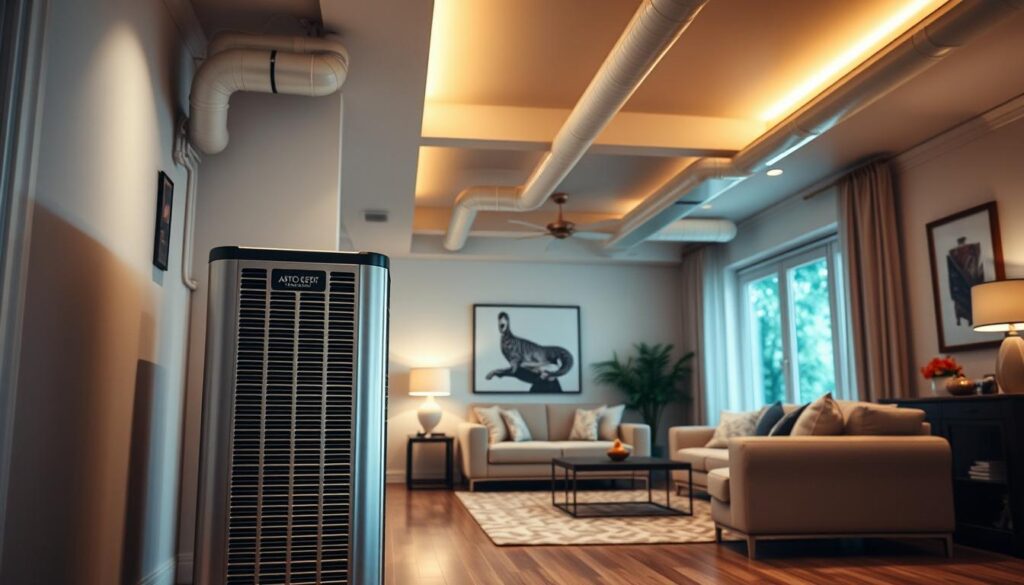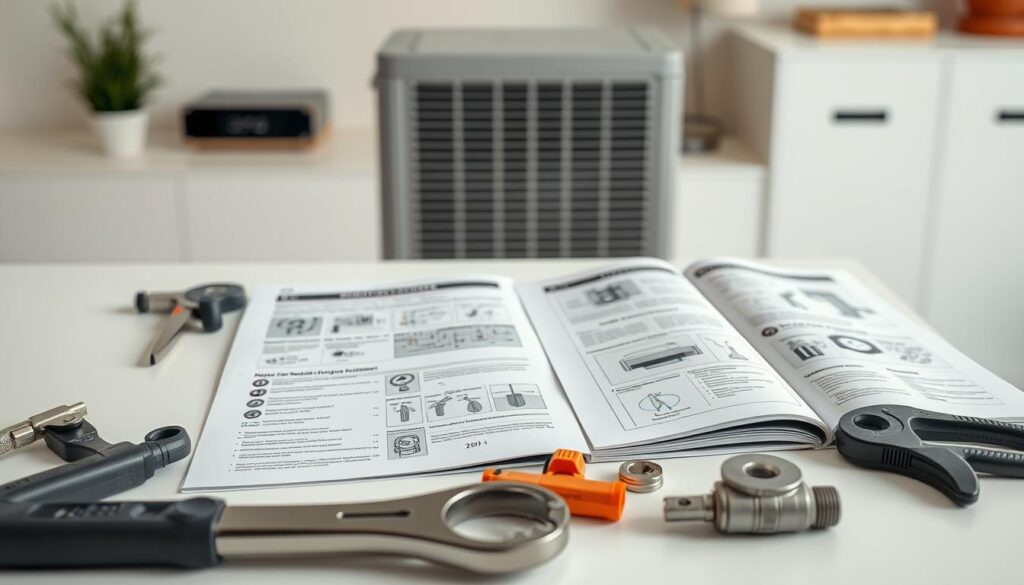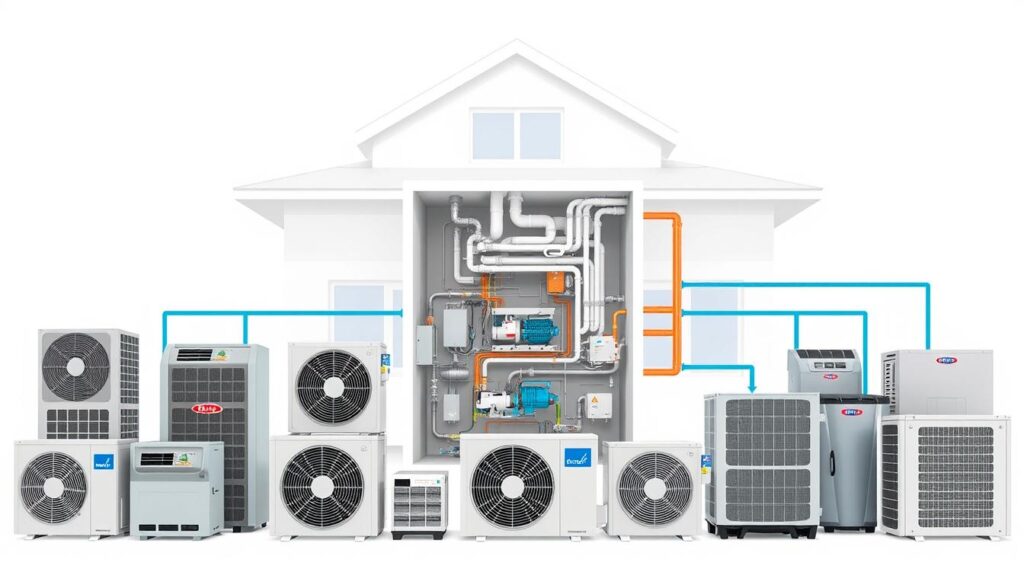Affiliate Disclosure
HVAC Guide Guys is a participant in the Amazon Services LLC Associates Program, an affiliate advertising program designed to provide a means for sites to earn advertising fees by advertising and linking to Amazon.
How Good Is HVAC? Ever thought about how one system can change your home’s comfort and air quality in minutes? HVAC systems are the quiet heroes of modern living. They work behind the scenes to make your indoor space perfect.

Your home’s comfort is more than just temperature. HVAC systems are complex networks that heat, cool, and ventilate your space. They do more than control temperature – they manage humidity, filter air, and ensure a healthy indoor environment.
Modern HVAC systems have changed home comfort. With new technologies, they now use energy better, cut down on utility costs, and offer more control over your indoor climate. Features like smart thermostats and variable-speed motors show how advanced HVAC is today.
Key Takeaways
- HVAC systems provide complete climate control
- Advanced technologies boost home comfort and efficiency
- Proper HVAC maintenance can cut energy bills by up to 30%
- Indoor air quality greatly affects health and well-being
- Energy-efficient HVAC systems save money in the long run
Table of Contents
Understanding HVAC Systems and Their Core Functions
HVAC systems are the heroes of home comfort. They work quietly to keep your home just right. These systems are key to making your living spaces cozy all year.
Today’s hvac systems are advanced. They control your home’s climate with great accuracy. They do more than just heat or cool; they also improve air quality and comfort.
What Does HVAC Stand For?
HVAC stands for three important things:
- Heating: Warming your home when it’s cold
- Ventilation: Moving and changing indoor air
- Air Conditioning: Cooling and drying your home
Basic Components of HVAC Systems
An hvac system has several key parts. They work together for the best performance and efficiency:
| Component | Primary Function |
|---|---|
| Thermostat | Controls temperature settings |
| Furnace | Creates warm air |
| Air Conditioner | Removes heat and moisture |
| Ductwork | Sends out conditioned air |
The Role of HVAC in Climate Control
Your home’s hvac system does more than just adjust the temperature. It also controls humidity, filters air, and ensures air moves well. With heating and cooling using over 50% of U.S. home energy, a good system can save you money.
“An efficient HVAC system is not an expense, but an investment in your home’s comfort and energy performance.”
Knowing how hvac systems work helps you make smart choices. This includes maintenance, upgrades, and ways to save energy in your home.
Explore Our HVAC Shop
Looking for top-rated HVAC tools, parts, and accessories? Visit our shop and find the perfect solution for your needs.
Visit the ShopHow Good Is HVAC: A Comprehensive Overview
Understanding HVAC means seeing its key role in keeping places comfy and healthy. HVAC systems are advanced technologies. They control the climate and air quality in homes and businesses.
Recently, HVAC systems have gotten much better. Today’s units can work really well, with some heating systems reaching up to 97% AFUE. This means almost all the fuel they use turns into heat.
“HVAC efficiency is not just about temperature control, but about creating a comprehensive indoor comfort solution.
Modern HVAC systems have many benefits. They improve indoor air quality, use less energy, and let you control the temperature. They also help the environment.
- Enhanced indoor air quality through advanced filtration
- Energy-efficient heating and cooling options
- Customizable temperature control
- Reduced environmental impact
Different HVAC setups offer special perks. Heat pumps do both heating and cooling. Ductless mini-split systems let you control the temperature in different areas. These show how HVAC systems now meet many comfort needs.
Choosing the right HVAC system depends on your needs. Consider your home’s size, the local weather, and energy efficiency. Getting it installed by pros and keeping it maintained is key to getting the most out of it.
Essential Components That Make Up Modern HVAC Systems
Understanding HVAC systems shows how they keep your home comfy. These systems are complex networks. They work together to control temperature and air quality inside.
Your home’s comfort comes from three main parts: heating, cooling, and ventilation. Each part is vital for a comfortable indoor space.
Heating Elements and Their Operation
Heating parts are the core of your HVAC system. There are two main types:
- Furnaces: Use natural gas, electricity, or oil to heat
- Heat Pumps: Heat and cool by moving thermal energy
Modern heat pumps work well even at 0°F. This makes them a top choice for energy-saving hvac brands.
Cooling System Components
Cooling parts in HVAC systems have key elements:
- Compressors: Start the cooling process by compressing refrigerant
- Condensers: Get rid of heat from the refrigerant
- Evaporator Coils: Take in indoor heat to cool
“The efficiency of your cooling system directly impacts home comfort and energy costs.”
Ventilation and Air Distribution Parts
Ventilation brings fresh air into your home. Important parts include:
- Ductwork: Moves air around the building
- Air Filters: Clean out dust, allergens, and pollutants
- Fans: Help air move and circulate
Keeping these parts in good shape can boost your HVAC’s efficiency by 30%. This ensures it works well and keeps the air clean.
Explore Our HVAC Shop
Looking for top-rated HVAC tools, parts, and accessories? Visit our shop and find the perfect solution for your needs.
Visit the ShopThe Impact of HVAC on Indoor Air Quality
Your home’s air quality is key to your health and comfort. How well does HVAC keep your air clean and safe? Modern HVAC systems are strong protectors of indoor air quality. They remove harmful pollutants and make your home healthier.
HVAC does more than just control temperature. It’s a complete air purification system. Here are some impressive stats:
- Filters out about 50% of indoor air pollutants when kept up
- Gets rid of at least 99.97% of airborne particles with HEPA filters
- Reduces airborne pathogens by over 95% with UV lamps
Indoor air can have many harmful things like dust, pollen, mold, and VOCs. A well-kept HVAC system keeps air moving and filters it. Using high-efficiency filters with a MERV rating of 8 or higher can greatly improve your home’s air.
“Clean air is not a luxury, it’s a necessity for healthy living.” – Environmental Health Expert
Regular upkeep is essential for HVAC’s air purification. Experts suggest:
- Change filters every three months
- Do seasonal maintenance checks
- Watch humidity levels
- Use advanced air purification tech
By investing in HVAC maintenance and knowing its air quality benefits, you can make your home safer and cleaner for you and your family.
Energy Efficiency and Cost Savings with HVAC
Getting an energy-efficient HVAC system can change your home’s comfort and wallet. Today’s HVAC tech lets you use less energy while keeping your home just right.
Understanding SEER and EER Ratings
When picking an energy-saving HVAC, SEER and EER ratings are key. They show how well your system turns electricity into cooling power.
- High-efficiency HVAC systems range from 16 to 21 SEER
- Going from an 8 SEER to a 16 SEER can save $660 a year
- 21 SEER units can save more than $16,000 over 20 years
Long-term Financial Benefits
An energy-efficient HVAC is more than just comfort. It’s a smart money move. It cuts down on energy use, leading to big savings on bills.
“Investing in an efficient HVAC system can cut energy costs by up to 50%.”
Energy-Saving Features
Today’s HVAC systems have cool features to save energy:
- Smart thermostats that learn your schedule
- Variable frequency drives that use less energy
- Advanced controls that cut down on energy use
Choosing energy-efficient HVAC tech means less carbon footprint and big savings for your home in the long run.
Explore Our HVAC Shop
Looking for top-rated HVAC tools, parts, and accessories? Visit our shop and find the perfect solution for your needs.
Visit the ShopHVAC Maintenance: Keys to Optimal Performance

Keeping your HVAC system in top shape is key for home comfort and saving energy. Regular maintenance can stop costly repairs and make your equipment last longer. By being proactive, you save money and keep your system running well all year.
Important maintenance tasks for your HVAC system include:
- Replace air filters every 1-3 months
- Clean outdoor units twice annually
- Clear vents and ductwork regularly
- Schedule professional hvac repair inspections
“Proper maintenance can prevent up to 90% of possible system breakdowns” – HVAC Industry Research
Homeowners can greatly benefit from simple maintenance steps. Changing air filters can cut energy use by up to 15% each year. Also, keeping a two-foot space around outdoor units helps airflow and efficiency.
Professional HVAC maintenance brings more benefits:
- Extends equipment life by 5-15 years
- Reduces unexpected repair costs
- Improves overall system performance
- Ensures optimal energy efficiency
Proactive maintenance is your best defense against expensive HVAC repairs and unexpected breakdowns.
Choosing the Right HVAC System for Your Home
Choosing the right HVAC system is important. It’s about finding the perfect fit for your home’s comfort needs. This means picking the right hvac installation for you.
Size and Capacity Considerations
Getting the size right is key for efficient heating and cooling. A system that’s too small can’t keep your home comfy. On the other hand, a system that’s too big wastes energy and raises your bills.
- Measure your home’s square footage accurately
- Consider ceiling height and room layout
- Evaluate insulation quality
Climate-Specific Selection Criteria
Every region has its own HVAC needs. HVAC experts suggest systems that match your local climate.
| Climate Zone | Recommended System | Energy Efficiency |
|---|---|---|
| Hot Humid Regions | Heat Pump | Up to 50% electricity reduction |
| Cold Regions | Multi-Stage Furnace | 90% AFUE rating |
| Moderate Climates | Ductless Mini-Split | 30% energy savings |
Professional Installation Requirements
Working with skilled hvac contractors is essential. Professional installation can boost system efficiency by up to 25%.
“A correctly installed HVAC system is key to home comfort and energy savings.”
Take the time to find trusted HVAC pros. They can help you pick the best system for your home’s needs.
Explore Our HVAC Shop
Looking for top-rated HVAC tools, parts, and accessories? Visit our shop and find the perfect solution for your needs.
Visit the ShopCommon HVAC Types and Their Applications

Exploring hvac systems reveals many types for different home comfort needs. Knowing about various hvac brands and systems helps you choose the right one for your home.
Homeowners often find themselves with a few main HVAC system options:
- Central Air Split Systems
- Ductless Mini-Split Systems
- Heat Pump Systems
- Hybrid HVAC Systems
- Packaged HVAC Units
Central air conditioning split systems are the most common choice for homes. They have an outdoor unit and an indoor air handler. This setup sends cool air through ducts.
“The right HVAC system can transform your home’s comfort and energy efficiency.” – HVAC Industry Expert
Ductless mini-split systems are great for homes without ducts. They let you control the temperature in different areas. This makes them perfect for new additions, renovated homes, or unique buildings.
| HVAC System Type | Best Application | Energy Efficiency |
|---|---|---|
| Central Split System | Large, Traditional Homes | High |
| Mini-Split System | Smaller Spaces, Additions | Medium-High |
| Heat Pump System | Moderate Climate Regions | Very High |
| Hybrid System | Regions with Temperature Variations | Highest |
Hybrid HVAC systems are the latest technology. They switch between gas and electric power. This can greatly lower your energy bills while keeping your home comfortable.
Benefits of Professional HVAC Installation and Service
Getting professional HVAC installation and service can really change your home’s comfort and energy use. Skilled hvac contractors do more than just set up the equipment.
Choosing professional hvac installation has many benefits. It protects your home’s most important climate control system.
Expert Installation Advantages
- Ensures 95% system efficiency through precise setup
- Prevents up to 30% efficiency loss from wrong sizing
- Guarantees compliance with local building codes
- Reduces long-term repair costs by up to 50%
Regular Maintenance Benefits
Professional maintenance is key for your HVAC system’s health. Certified techs can make your system last 5 to 15 years longer with the right care.
| Maintenance Aspect | Impact |
|---|---|
| Annual Inspections | Prevents 70% of major repairs |
| Filter Replacement | Keeps up to 95% system efficiency |
| Seasonal Tune-ups | Extends system life by 5-15 years |
Emergency Service Support
Reliable hvac contractors offer vital emergency help. They respond quickly to stop small problems from becoming big, expensive issues.
“Professional maintenance is an investment in your home’s comfort and long-term efficiency.” – HVAC Industry Expert
Choosing certified pros with NATE certification (only 20% of techs have it) means top-notch service and peace of mind.
Explore Our HVAC Shop
Looking for top-rated HVAC tools, parts, and accessories? Visit our shop and find the perfect solution for your needs.
Visit the ShopEnvironmental Impact and Sustainability Features
Your HVAC system is key to saving the planet. New HVAC tech makes homes comfy while cutting down on pollution. Buildings use about 40% of all energy, so picking the right HVAC is vital for the environment.
Modern HVAC systems do more than just heat and cool. They have important green features:
- Reduced greenhouse gas emissions
- Lower energy consumption
- Integration of renewable energy sources
- Advanced eco-friendly refrigerant technologies
How does HVAC help the environment? Very well. New systems like air-source heat pumps cut down emissions by up to 50%. Geothermal heat pumps can be even more efficient, using up to six times less energy than they produce.
| HVAC Technology | Energy Efficiency Improvement | Environmental Impact |
|---|---|---|
| Variable Refrigerant Flow (VRF) Systems | Up to 30% energy reduction | Significant carbon emission decrease |
| Solar-Powered HVAC | 1-3 tons annual carbon emission reduction | Renewable energy integration |
| Energy Recovery Ventilation | Up to 50% energy strain reduction | Improved air conditioning efficiency |
“Sustainable HVAC solutions are not just an option—they’re becoming a necessity for environmentally conscious homeowners.”
Choosing energy-efficient HVAC systems and keeping them in good shape helps the planet. It also makes your home more comfortable.
Conclusion
Understanding how good HVAC systems are shows a new way to make your home comfortable and save energy. It’s not just about keeping your home warm or cool. It’s about making your living space the best it can be, in every way.
When you look at HVAC costs, you see big savings over time. Energy-saving systems can cut your energy bills by up to 30%. Smart tech can save another 10-15%. A top-notch HVAC system makes your home more comfortable and can even increase its value by up to 10%.
The future of home climate control is smart, green, and made just for you. By choosing the right HVAC system and keeping it in top shape, you can make your home healthier and more comfy. Talking to HVAC experts can help you find the best system for your needs, ensuring it works well and saves energy.
Your home needs a smart climate control system that brings comfort, saves money, and helps the planet. Start making your home smarter and more efficient today. Look into modern HVAC technologies to change your living space for the better.

